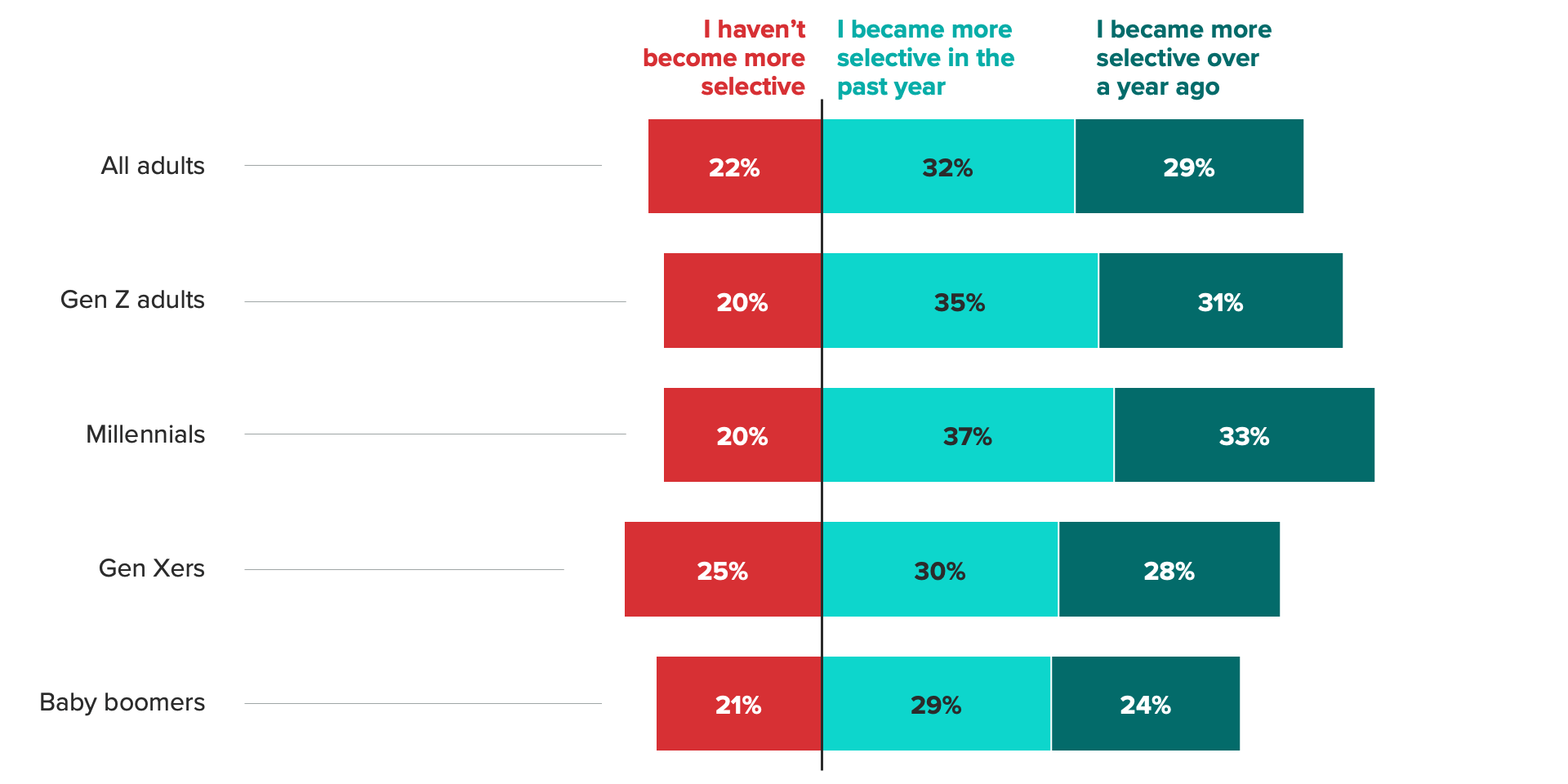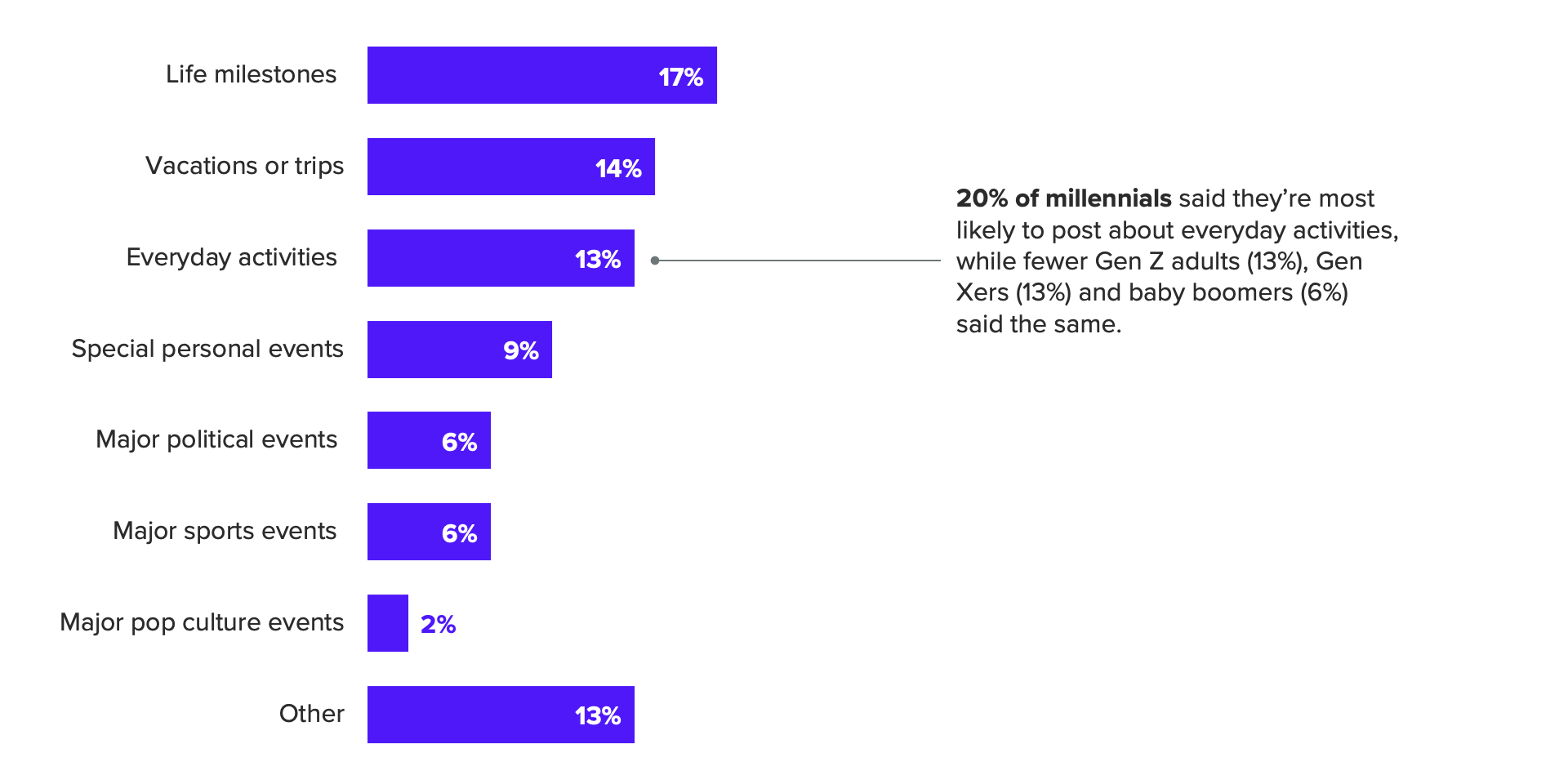People Have Become Pickier About What They Post to Social Media

Key Takeaways
The bar for what warrants a social media post has risen in recent years.
In September, 61% of all adults with a social media account said they’ve become more selective about what they post on social networks, and 28% report posting less on their preferred platform compared with last year.
This trend is unlikely to reverse course, signaling that sharing posts among close connections will rise, and companies will have to rethink strategies aimed at driving buzz.
Data Downloads
With robust sample sizes, Morning Consult’s public opinion data can be analyzed by specific demographics, such as gender, generation, political party, income, race and more. Please contact [email protected] to purchase this data.
There have been many think pieces about how the average social media user is posting less often, coinciding with growing demand for close friends-only sharing experiences. Head of Instagram Adam Mosseri said in July that photos and videos shared via direct messages are growing faster than anywhere else on the platform, including feed and stories. Meanwhile, TikTok’s recent hiring efforts suggest the video platform has bigger private messaging ambitions.
Further examination reveals a shift in mindset around social media posting. New Morning Consult data shows that majorities of social media users across generations say that they’ve become more selective about what they post, with nearly one-third saying this change has occurred within the past year. Moreover, nearly 3 in 10 social media users said they’ve posted on their preferred social platform less in the past year.
Nearly 3 in 10 Social Media Users Have Cut Back on Posting
This indicates that social media platforms will need to find new ways to allow for the sharing of posts between users and their close connections. Meanwhile, with users showing greater reluctance to post, video streaming platforms’ product changes should aim to maximize social media buzz surrounding titles.
Younger consumers are cutting back on posting the most
The notion that social media is becoming more reliant on brand and influencer posts has been widely discussed, but the conversation often relies on anecdotes about changing behaviors. Morning Consult data, however, quantifies this declining willingness to post on social media.
Across generations, the shares of social media users who said they’ve become more selective about what they post in the past year are comparable to those who said the change happened more than a year ago. Social media shifts have impacted attitudes toward posting: Instagram becoming flooded with influencer reels, for example, may have caused some users to feel like their everyday life is too mundane to justify frequent posts.
Growing concern about social media’s impact on well-being is also likely responsible for a downtick in posting. A May report from the U.S. surgeon general warned of the harm social media can have on adolescents’ well-being. This helps explain why 27% of those posting less on social media cited mental health concerns as a reason for not sharing as much.
Social Media Users Are Choosier About What They Post

For many, becoming more selective is leading to fewer posts rather than an uptick in sharing highly polished photos or videos. Of all adult social media users, 28% said they’ve posted less often on their favored social media platform this year, while that figure was 37% for Gen Z adults.
The high share of Gen Zers posting less is alarming for social networks because publicly growing activity from this cohort is the quickest way to attract brand investment. Gen Z activity is why news organizations had to warm up to TikTok, for example.
To offset the decline in widely shared content by casual users, platforms like Instagram and TikTok will become even more reliant on influencer content in public feeds. This increases the urgency for platforms to boost ad revenue sharing and creator fund payouts as short-form video becomes more popular. A 2022 report by Linktree found that only 12% of full-time creators make more than $50,000 annually.
Specific demographics at scale: Surveying thousands of consumers around the world every day powers our ability to examine and analyze perceptions and habits of more specific demographics at scale, like those featured here.
Why it matters: Leaders need a better understanding of their audiences when making key decisions. Our comprehensive approach to understanding audience profiles complements the “who” of demographics and the “what” of behavioral data with critical insights and analysis on the “why.”
We can also expect social platforms to mount an even greater push to win over Gen Zers who don’t want to share posts widely by helping this young cohort strengthen connections with their close friends. For example, product features like Instagram’s September test that let users share feed posts with select friends will become more common. Gen Z’s penchant for close connections explains why BeReal, which has lost virality but still reports 25 million daily users, recently nixed its tab that surfaced strangers’ content in favor of a feed showing posts from friends of friends.
As younger consumers cut back on posting, brands must rethink their marketing strategies
As social media becomes even less reliant on users’ everyday content, the impact will be felt across many industries. Efforts by platforms like X and TikTok to become more e-commerce centric could benefit from feeds that are more focused on selling products. We’re also likely to see at least one major social player make a fresh push into original content production, which could give rise to digital originals across food, comedy and music — three of the most popular influencer content types.
Hollywood in particular will need to rethink how to effectively drive online buzz for TV shows and movies. Morning Consult data shows that consumers are already much more likely to recommend a show or film they like to someone in person than they are to post about it on social media.
The high likelihood of in-person recommendations reinforces the value of keeping TV and film titles succinct, as it’s easier for a consumer to recall and Google “Smile” than “Something’s Wrong With Rose” (the horror film’s original name) hours after hearing it from a friend. Recommendations made through text or social media put less pressure on a consumer to remember a specific name because it’s usually automatically saved in a chat or on someone’s profile.
Consumers Are More Likely to Recommend Titles in Person Than Through Social Media Posts
But if consumers continue to cut down on social media posts, organic virality will become harder to achieve. To prepare for this likely scenario, studios need to make it more seamless for people to post about what they’re watching. This could mean a video streaming service like Netflix prominently featuring an Instagram stories share button on its mobile interface for certain titles, for example.
Getting Gen Zers to share more content will be particularly tricky, as only 13% of this cohort said they are most likely to post about everyday activities, like watching TV, on social media. Studios should have an easier time convincing slightly older consumers to post about TV and film, as similar shares of millennials said they are most likely to post about everyday activities and life milestones. This willingness to post about everyday activities was not observed among any other generation, underscoring why millennials can serve as natural ambassadors for regularly broadcast TV programs like talk shows.
Social Media Users Are Most Likely to Post About Life Milestones

An increasingly popular way to boost a title’s reach on social media is to just upload an entire episode or movie to a social platform, which we’ve been seeing more authorized and unauthorized examples of. With this strategy, a title can get boosted in a social platform’s algorithm by consumers who like a post even if they rarely post themselves.
There’s a limit to how much this strategy can be scaled, given that streamers would be ceding viewership data to platforms like X that would otherwise go directly to Netflix or another streamer.
Meanwhile, some Gen Zers will continue posting only about the most important events in their lives, and the next generation could turn out to be even more reticent. It’s up to entertainment companies to take a more active role in shortening consumers’ path to posting.
Kevin Tran previously worked at Morning Consult as the senior media & entertainment analyst.


